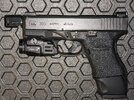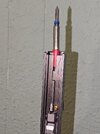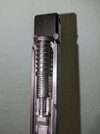usp9
Member
I voted HK because they've never failed me and I shoot them well, but I've learned to love my Caniks almost as much. I call them my "Turkish HKs".
However, I love all my children.
However, I love all my children.


That's pretty much what I would go with too...SIG, H&K, S&W in order.










Who did the optics cuts for your Steyrs?View attachment 1176024
Steyr all the way . I have 3 Glocks , not even close .
What's Polymer2? Also, what's different from Polymer1?I like Glocks because they are made with the strongest polymer available, Polymer2
I did . I made the compensator’s as well .Who did the optics cuts for your Steyrs?
That's funny right there, I tell you what.I like Glocks because they are made with the strongest polymer available, Polymer2, and thats a huge advantage especially for making lightweight pistols in powerful calibers or upgrading to more powerful calibers like 40 super 45 super 460 Roland 960 Rowland 400 Corban and even 357 sig and 45 Gap in small frame pistols. That wouldn't be possible without Polymer2.
Apart from that, I also really like their trigger safety system , the modularity of trigger parts, the availability of aftermarket parts, and the fact that the slides are made just as strong as HK guns, if not stronger.
That's Polymer 2.0 and there's also Polymer 3.0. Totally different. Glocks patent is spelled precisely Polymer2.That's funny right there, I tell you what.
(Polymer2 is a development library for web sites, produced by Google and others.)
There's no such thing as Polymer 1, there is just regular polymer plastic material. Polymer2 is a patent and the recipe is very well protected. No one really knows how to make it except Glock himself. Although there are some things that are known, not really a whole lot except for its capabilities.What's Polymer2? Also, what's different from Polymer1?
Harder than steel per its weight, but not really harder than steel. The grip of a Glock is like what 8-10 oz or so? If someone made a grip for a Glock that weighed 10 oz out of steel technically the steel would be too thin and the polymer2 would be stronger, but if the Glock grip was made with steel correctly and weighed like 25 oz or more it would definitely be harder than the polymer2. The polymer flexes during recoil as well. And yes, Gaston is a mad scientist and a genius as well. He revolutionized the handgun market many years ago.That's Polymer 2.0 and there's also Polymer 3.0. Totally different. Glocks patent is spelled precisely Polymer2.
There's no such thing as Polymer 1, there is just regular polymer plastic material. Polymer2 is a patent and the recipe is very well protected. No one really knows how to make it except Glock himself. Although there are some things that are known, not really a whole lot except for its capabilities.
Harder than steel(in some way)
Corrosion resistant
Acid resistant
Long lasting (over 100 years)
UV resistant, but not proof
Among other stuff, I'm sure it's also an easy process to make. Gaston is a mad scientist.
You can google "Glock Polymer2" and find loads of information.
If you take a drill bit or a dremel to the Glock frame they will cut right through. That won't happen to a steel frame. If you take a hammer to the polymer and the steel, both of the same thickness, the steel will deform before the polymer2 does.Harder than steel per its weight, but not really harder than steel. The grip of a Glock is like what 8-10 oz or so? If someone made a grip for a Glock that weighed 10 oz out of steel technically the steel would be too thin and the polymer2 would be stronger, but if the Glock grip was made with steel correctly and weighed like 25 oz or more it would definitely be harder than the polymer2. The polymer flexes during recoil as well. And yes, Gaston is a mad scientist and a genius as well. He revolutionized the handgun market many years ago.
You just made all that up.Glocks are not bulletproof. Bullets will go through the frames just like they would go through any plastic. Depending on the bullet it will damage other parts of a Glock just as one would expect other pistols made of the same materials to be damaged by bullets.
The best source I can find indicates that Glocks are a Nylon alloy, probably Nylon 6. It's a good plastic/polymer, but not anything miraculous, and if Glock really does use a proprietary formulation, it's not going to provide material properties that are amazingly better than other similar Nylon alloys.
The polymer that Glocks are made from is not harder than steel--in any way. It is very strong for its weight, but it is no where near as strong or as hard as steel.
It is true that polymers can react better than metals to repeated impact/flexing stress because the stronger polymers can flex more without fatiguing or deforming.
Of course I didn't. At the very least, you can poke around a little and see that I've posted similar information going back decades. So even if I made it up (which I didn't), I didn't JUST make it up, I've been saying it for a very long time.You just made all that up.
I didn't miss it at all, but I did try to disregard it in the interest of being polite. Since you won't let me disregard it, I'll respond. That's pure nonsense. Of course you can cut steel with a dremel. It is true that plastic can be cut a lot easier, but I've cut a lot of steel with drills and dremels.You must have missed my post were i said that a drill or dremel can cut the polymer and not steel.
Yes, that's correct. I have a number of books on Glocks in my personal library and have also done a lot of reading from online sources. In addition to taking a number of classes directly from Glock.The information is out there for anyone to find just google and read through several well sourced pages. Things like this require reading, not YouTube videos.
Sure, just like the Coke formula is closely guarded. Of course, anyone with the proper equipment can tell exactly what's in it if they want. The technology to do so has been around for a hundred years or so.There are theories to how Polymer2 is made, but no one can replicate it. ... You will find that Polymer2 is one of the best guarded corporate secrets in the world.
Of course the composition can be known, not the process. Its the process thats patented as well as the result.Of course I didn't. At the very least, you can poke around a little and see that I've posted similar information going back decades. So even if I made it up (which I didn't), I didn't JUST make it up, I've been saying it for a very long time.
I didn't miss it at all, but I did try to disregard it in the interest of being polite. Since you won't let me disregard it, I'll respond. That's pure nonsense. Of course you can cut steel with a dremel. It is true that plastic can be cut a lot easier, but I've cut a lot of steel with drills and dremels.
Yes, that's correct. I have a number of books on Glocks in my personal library and have also done a lot of reading from online sources. In addition to taking a number of classes directly from Glock.
Sure, just like the Coke formula is closely guarded. Of course, anyone with the proper equipment can tell exactly what's in it if they want. The technology to do so has been around for a hundred years or so.
There's nothing magic about the Glock polymer. Yes, it's a proprietary formula, and I'm sure it's a very good polymer--it's certainly holding up very well in all the several Glocks I own--but the idea that it offers some tremendous benefits over similar Nylon alloys just doesn't hold water.
Here's some information on the topic from one of our own.
Glock Boiling???
Plastic is made from OIL!!! how could water do anything to it???www.thehighroad.org
"Last FTIR I ran on the Glock polymer was kind of inconclusive (the results didn't differentiate as well as I'd've liked) but the exemplar library matches it as Nylon 6 nonetheless. Overall, my best guess is that the Glock polymer is a glass filled impact grade of Nylon 6, possibly blended with a hybrid."
FTIR is Fourier Transform Infrared Spectroscopy, a technique commonly used to identify the ingredients of organic materials.
If you want some additional information, you can google for a source named MarkCO, a forensic engineer named Mark Passamaneck, who, among other things, coauthored a book on Glocks. He has had the opportunity to do some careful analysis of Glocks and has posted information about the composition of Glock frames
Glock knows plastics, no question, but the idea that they have some kind of ability to make a plastic with properties no one else can begin to duplicate is going to be a tough argument to support with objective facts, as opposed to corporate propaganda. There are companies out there that have been working with plastics a lot longer and have a significant knowledge base. Dupont, the inventor of Nylon, for example, who was already making nylon when Gaston Glock was only 6 years old might just be a contender.Of course the composition can be known, not the process. Its the process thats patented as well as the result.

Any decent quality gun that's cared for properly can last a very long time. I have a plain old steel gun that was my great-grandfather's. Nothing really special about it. The hard rubber grips on it are still in perfect condition too--must be that Colt had some magical recipe for hard rubber or they wouldn't have lasted so long, right?...when it comes to Glocks, its the gun I expect to be handing to a great grandchild, and they to theirs.
Maybe, maybe not. Glock isn't as dominant as it was. I'm not saying they're going to disappear soon, and you are certainly correct about there being a lot of aftermarket support for them, but the idea that they are still going to be dominant in the market and the aftermarket, decades down the road is speculation. When Mr. Glock passes away, it will be interesting to see what direction the company takes. Ruger certainly made some sweeping changes when Ruger Sr. and Jr. were no longer running the company.Even aftermarket parts will be made available to Glocks that are far beyond what you can even imagine today. Other guns will be fine as well, but they will be ones I would not expect much from...
